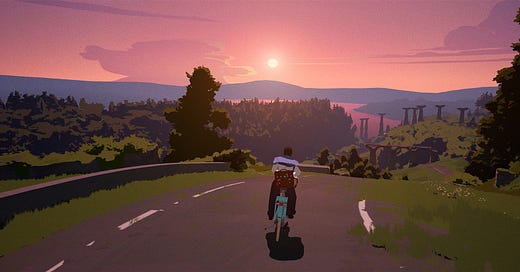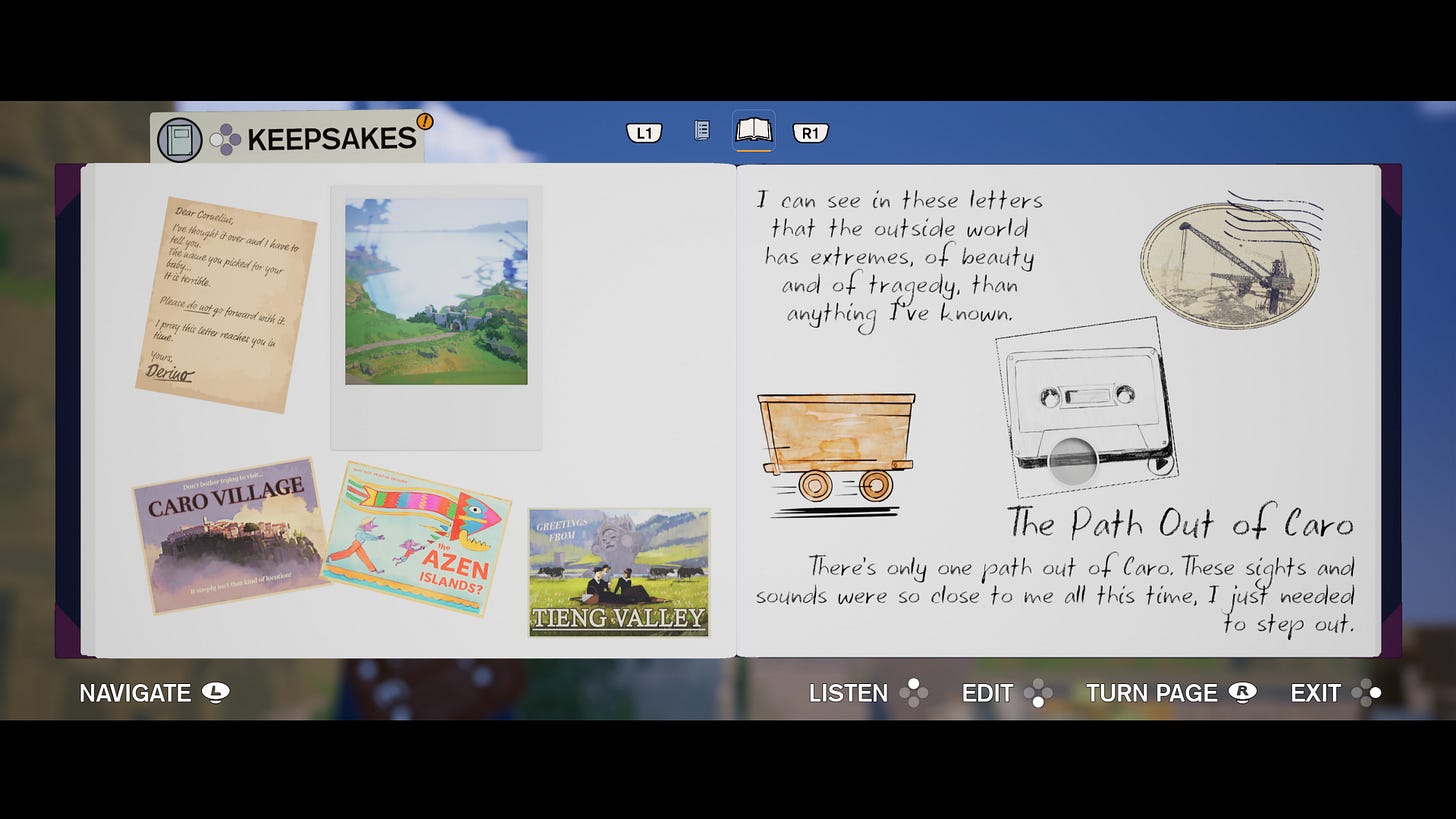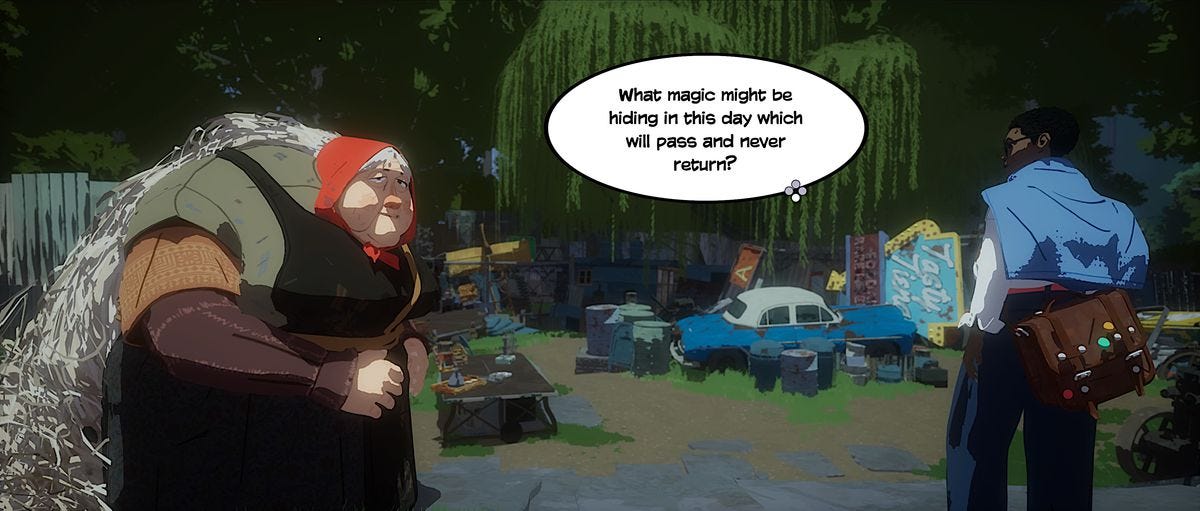PC, PlayStation, and Steam Deck
$29.99 on Steam and PlayStation
7 hours long
In Season, you bicycle through beautiful landscapes, documenting the world as you go by taking photos, recording audio, drawing sketches, and collecting mementoes for your scrapbook. Eventually the scrapbook will be stored in a museum vault to survive an impending, tumultuous changing of the “season”.
So, what is a “season”? Well, that’s the problem. As far as I can tell, it’s a period of a few decades or maybe a century or two, with a theme that encompasses the world – so there’ll be a season of peace, then a season of war, and then something else. When seasons change, everyone’s memory gets wiped so people forget what happened yesterday and start living in an entirely different way.
But buildings and monuments survive, and so do things in museum vaults too, which means it’s not actually true that everything gets reset because what’d be the point of the scrapbook otherwise? Of course, it’s not like people forget everything either, otherwise what would happen to kids, and how would people keep farms running, and wouldn’t all the power plants blow up? And indeed, you meet people who tell you about events from earlier seasons, which is nice but seems contradictory.
The more I try to explain how seasons work, the less they make sense. If that annoys you, you won’t like Season; and if it doesn’t, you might love it.
You can probably guess where I fall on that line.
Which is not to say I disliked everything in the game. As I travelled through Season’s landscapes, I was touched. I helped a family facing evacuation choose what to take with them; their possessions were all piled up in a field, in a floor plan of the new flat they were moving into. Deep in the woods to the east, past an avenue of trees strewn with lanterns, I came across an old artist’s sculptures. She asked me to photograph them so could see them one last time, unmuddied by her fading eyesight. When I showed her my scrapbook, she was pleased her art might live on past the season.
That’s Season at its best, reminding us that it’s worth making space and time to document memories.
It’s an incredibly pretty game. I found myself jumping off my bicycle every thirty seconds to photograph yet another beautiful new vista, yet another stunning sunset, concept art made flesh. The game is constructed for those moments, the rise of a hill and the curve of a cliff revealing photo ops with the most immaculate vibes. It’s like if you asked Midjourney AI to make a game in the style of Firewatch and Journey. It’s almost too perfect, a little too conventional in its Instagrammable beauty, but few would complain about that.
If the designers stopped there, that would’ve been enough. But the game’s website also promises we’ll “contemplate and make difficult choices that could affect how the story ends,” “collect memories, make recordings and piece together the secrets of the world of Season,” and “meet a diverse cast of characters, each of whom has two precious things to share with you: the stories of their lives and a moment together at the end of the season.”
Given that I imagine most players who’ve seen Season’s marketing will only remember its amazing vibes, it’s puzzling why they felt it was necessary to add so much extra stuff. Let me list the things you do in this game:
Ride your bicycle. It feels great. On the PlayStation 5, you pedal by squeezing your controller’s left and right triggers, their resistance varying based on slope and speed. We should have more cycling games like this!
Take photos. This is nice. I never used any of the filters or focus settings.
Record audio. You point your microphone at an audio source for a few seconds, which records an entire clip. It’s fine, but unlike taking photos, you rarely encounter things worth recording, which gives it a perfunctory feeling.
Collect things. Letters, postcards, trinkets, that sort of thing. It’s OK. There are way too many of them.
Add those things to your scrapbook. You already know whether you like this kind of thing, but regardless: you have to do it. A lot. And each time, you need to select and position and resize those things.
Talk to lots and lots of people. There are a surprising number of people and they all have plenty to say. It’s not great. More on this later.
…and make decisions for them. Don’t worry – it makes no difference!
Unravel a mystery. Ummmm… what?!
This is a surprisingly interactive game for something I thought would be about cycling along coasts and mountains and taking photos! Story-driven exploration games (“walking simulators”) usually have far fewer things to do; Firewatch is almost entirely about map-reading and using a walkie-talkie. Why so simple? Well, it’s hard enough to make even a single mode of interaction feel good in a game, let alone half a dozen.
Season could’ve easily been a game only about cycling, taking photos, and talking to the occasional person. Instead, I felt pressured to Always Be Scrapbooking so I could fill up my literal “memory meter” (or whatever it was called) and unlock extra insights, stopping me from getting immersed in the world.
Now, you could say: ignore the scrapbook! But taking a photo of specific vistas and objects unlocks additional (and occasionally vital) information as your character comments on what she sees; the same for recording audio or collecting things. This, combined with various scrapbook-related puzzles, turns the process of documenting into an unpleasantly gamified chore.
And there are so many things to photograph ad collect that aren’t beautiful. Season tells its story through innumerable posters, plaques, letters, graffiti, billboards (“environmental storytelling”), all of which you’re compelled to laboriously interact with and read in order to progress, or at least understand what the hell is going on. Environmental storytelling can easily become repetitive in a game that doesn’t know what players have already seen – designers placing posters and graffiti and billboards all saying the same thing to make sure absolutely players get the message in case they don’t see them all – and that’s exactly what happens in Season.
Talking to characters feels just as clunky. In most conversations, you have to press a button to play the next spoken line, even if that means pressing twenty times in a row while someone relates a story. Not only is this tedious, but it results in weird pacing; if a character is going to say twenty uninterrupted lines, why not just have each line play automatically, one after the next – you know, like in real speech?
I could excuse all of this if the writing were good. It’s not.
Season’s writing strains for sincerity with every word. It tries so hard to be profound, but it’s just po-faced. To be clear, I am not against profundity! Profound people are some of my best friends!
But if you’re going to make players sit through a ton of reading and dialogue with nothing to do, it needs to be as well-written and as well-acted as anything else we can spend time on. Instead, players have to sit through someone literally recounting their dream, famously the most boring thing to listen to.
Here’s some of the writing:
“I try to divide the things I see between two categories: permanent and impermanent. But the division breaks down. The difference is just a feeling.”
“The land curves, we curve it, and are curved by it in turn. Along the way I hear and smell and touch and listen.”
“What is a symbol but a word without a sound?”
“I hold tight to the feeling of being almost lost, barely lost, wandering without conviction. If I could talk to dad I would tell him this feeling in detail.”
“The scale of the old world grew beyond human proportion, maybe beyond human feeling. The parking lot will never die.”
On a letter:
Passers-by, I’ve shared my mixed feelings on a certain new organisation. These are my potential perspectives. What is your perspective? I left some paint around. Make a mark. Give another view.
On a plaque by ruins:
These Atmospheric Ruins Has [sic] been designated a symbol of THE UNFATHOMABLE NATURE OF THE PAST. What is this? A bridge? Some kind of aqueduct? Who built it? Why did it fall apart? We don't know but we'll live beside this hulking structure for the rest of our lives.
It’s all like this. Designers: if it’s too hard to write well - and it is hard - just cut the words until you can manage it!
Case in point: the old artist in the woods. After you’ve photographed her sculptures, you can show her other photos you’ve taken across the valley and she’ll tell you a tale about them. She was able to do this for over twenty of photos, and are just the ones I took in a quick playthrough! There is a reason most games don’t let players do this: it’s because it’s very hard to write good, believable dialogue in such high quantity.
And now we reach the most confounding part of Season – its politics.
Mild spoilers!
Once, there was a golden season. Then there was a season of war. The war eventually ends when a monk, sick of all the killing, prays to put all the soldiers to sleep. Then a new season begins.
This is a child’s view of the world. It would make sense in a fantasy, but the world of Season is closer to our reality. It’s a world of trucks and TVs and hydro dams and motorways. It wants to say something important to us, but it can’t even take war seriously. It’s a world where people talk of “internationalism” and of a golden age (for whom?), but never about why these things happen, just that war is bad. I don’t need Season to give me a manifesto, I want it to give me a point of view, yet all it’ll show me are platitudes and pretty pictures.
The gaping void at the heart of Season also jumped out at Malindy Hetfeld in her review for The Guardian:
The world of Season, which is so crucial to its functioning, feels less like a real place and more like an amalgam of cultural influences scrubbed of their real-world significance. Here, Japanese shimenawa ropes appear next to Scandinavian architecture, while men in Stasi-like uniforms casually dictate behavioural rules via propaganda posters.
…The game is enamoured with ideas of community and culture, but in appropriating real culture and removing it from context, it robs itself of its own message …Season [is unwilling] to paint the world in anything but the broadest strokes (“Internationalism was breaking down”) and [a] penchant for flowery but meaningless language.
Instead, Season asks us to uncover a mystery involving experiments with magical crystals that absorb memories. It’s so confusing and drawn-out that it shatters the game’s chill, contemplative vibes.
Spoilers over!
Season reportedly had a very hard time in production. A year before launch, the studio’s creative director was accused of screaming at, belittling, and groping employees, their behaviour enabled by the CEO (they were both reinstated a few months later). Perhaps the disjointed dialogue and various bugs I encountered were the result of these problems. But I suspect Season’s bad writing, confusing plot, and overstuffed mechanics were there from the start. And I’m not alone; a lot of players don’t understand the most basic and important parts of its story.
And yet most of them enjoyed the game! So it is fair for someone to respond: well, I liked the writing, I wasn’t bothered by the mechanical issues, I loved the art. That’s fine: most reviewers liked it too, Hetfeld notwithstanding. I would bet good money on it being shortlisted in awards like BAFTA’s Game Beyond Entertainment and Artistic Achievement categories. And having sat on those jury panels in the past, I wouldn’t be surprised if it won.
That would be a shame. It’s far from the worst game I’ve played. Even as I write this, I wonder if I’m being too harsh, if its art and sincerity don’t redeem its failings. But I can’t get over my disappointment in its writing, in its story, and in its execution.
Season could have said so much more by doing so much less.
Have You Played? is an experiment in taking games seriously, but in a fun way. Tell me what you’d like to see more of! And if you liked it, share it with your friends.







